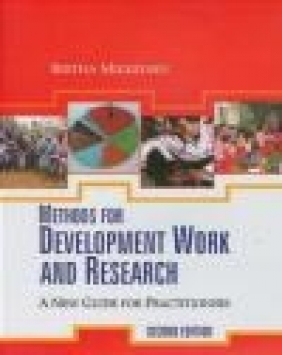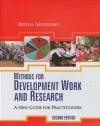Methods for Development Work
Britna Helena Mikkelsen, B Mikkelsen
Methods for Development Work
Britna Helena Mikkelsen, B Mikkelsen
- Producent: Sage Publishing
- Rok produkcji: 2005
- ISBN: 9780761933274
- Ilość stron: 384
- Oprawa: Twarda
Niedostępna
Opis: Methods for Development Work - Britna Helena Mikkelsen, B Mikkelsen
Praise for the First Edition: 'It is a guide of vital importance to researchers, trainers and extension workers, especially those collaborating with communities in developing countries' - "European Journal of Development Research". 'There is much of value here that even experienced development workers might learn from! Mikkelsen offers many insights that would be valuable to any economist undertaking field work in development' - "The Australian Journal of Agricultural Economics". 'An enthusiastic, vibrant supplement to methodology texts! The formulation is concise, comprehensive, yet substantial' - "Business Line". 'Development researchers will be grateful to Mikkelsen for her laudable job in competently assessing their needs! She provides an overview of the traditional and the new techniques and tools for field study' - "Deccan Herald". This is the completely revised version of the highly successful textbook first published in 1995. This edition incorporates new lessons learned regarding the merits and pitfalls of development work, including particpatory methods and participatory development in practice. "Methods for Development Work and Research" outlines significant trends in international development co-operation with reference to change and continuity. It incorporates critical perspectives on participation to allow practitioners to reflect on the theoretical as well as the practical and ethical implications of their work. It provides examples of participatory methods in use particularly in macro-policy, budgeting and poverty reduction strategies. It provides guidance on how to analyze qualitative data using indicators and IT tools. It highlights the gender perspective in development work; elaborates on a rights-based approach to development which is currently replacing the conventional needs-based approach. It focuses in greater detail on monitoring and evaluation. It elaborates on ethics, methods and development interventions. It addresses the important question of the problems of encountering 'other' cultures. Based on feedback received in response to the first edition and also the author's hands-on experience, this revised version continues to offer valuable and practical guidance combined with critical reflection on methods for development work and research. Dr Britha Mikkelsen is a senior social science and research specialist with COWI, Denmark, with wide experience in conceptualizing, conducting and coordinating project and program evaluations and impact studies. Praise for the First Edition: 'There is much of value here that even experienced development workers might learn from... Mikkelsen offers many insights that would be valuable to any economist undertaking field work in development' - The Australian Journal of Agricultural Economics 'An enthusiastic, vibrant supplement to methodology texts... The formulation is concise, comprehensive, yet substantial' - Business Line 'Development researchers will be grateful to Mikkelsen for her laudable job in competently assessing their needs... She provides an overview of the traditional and the new techniques and tools for field study' - Deccan HeraldPART ONE: CONTEXT AND FOCUS OF THE GUIDE Issues and Approaches in Current Development Co-Operation Dialogue, Problem Identification and Planning Cycle Target Groups, Readership and Terminology PART TWO: PARTICIPATION IN DEVELOPMENT - THE CONCEPT AND CRITICAL PERSPECTIVES Perceptions of Participation Participatory Methods, Techniques and Tools Strategic Considerations for Using Participatory Methods Critical Perspectives on Participation PART THREE: PARTICIPATORY METHODS IN USE Illustrations of Selected Participatory Methods Spreading Uses of Participatory Methods Topical Applications of Participatory Methods PART FOUR: DIFFERENT TYPES OF DEVELOPMENT STUDIES - PURPOSE, METHODS AND DESIGN Types and Forms of Development Studies Research Purpose, Goals and Focus Research Methods and Possible Combinations Research Process and Research Plan PART FIVE: DATA GENERATION AND ANALYSIS OF QUALITATIVE DATA Theory-Based Data Generation and Analysis Analysis of Qualitative Data Standards of Quality for Qualitative Research PART SIX: SELECTED DEVELOPMENT ISSUES AND APPROACHES A Rights-Based Approach to Development Poverty Reduction - Evolving Agenda and Poverty Analysis Women in Development and Gender Perspectives Innovative Approaches - Appreciative Inquiry, Social Capital Assessment, Geomatics PART SEVEN: MONITORING AND EVALUATION Monitoring and Evaluation - for Accountability and Learning Aid Evaluation, Basic Evaluation Designs and Primary Uses of Evaluation Findings Participatory Monitoring and Evaluation Impact Monitoring and Evaluation Learning from M&E and Impact Studies PART EIGHT: CONCLUSION ON ETHICS AND INTERVENTIONS Images of 'the Others' Interventions, Interference and Agents of Change Dilemmas of Topics and Methods and Reminders on Conduct
Szczegóły: Methods for Development Work - Britna Helena Mikkelsen, B Mikkelsen
Tytuł: Methods for Development Work
Autor: Britna Helena Mikkelsen, B Mikkelsen
Producent: Sage Publishing
ISBN: 9780761933274
Rok produkcji: 2005
Ilość stron: 384
Oprawa: Twarda
Waga: 0.9 kg





















